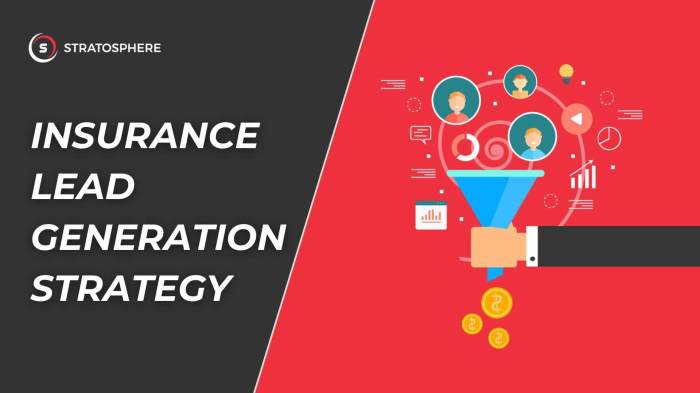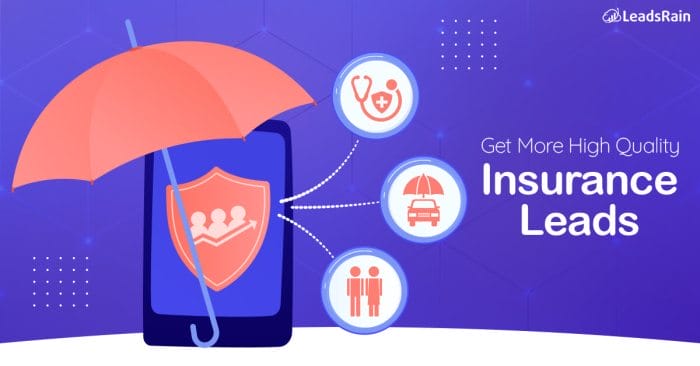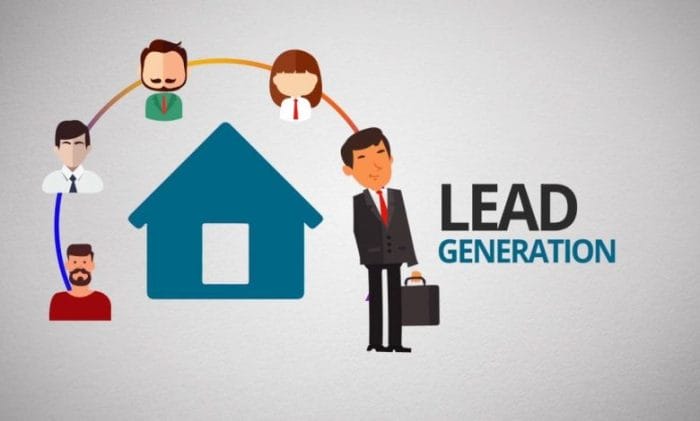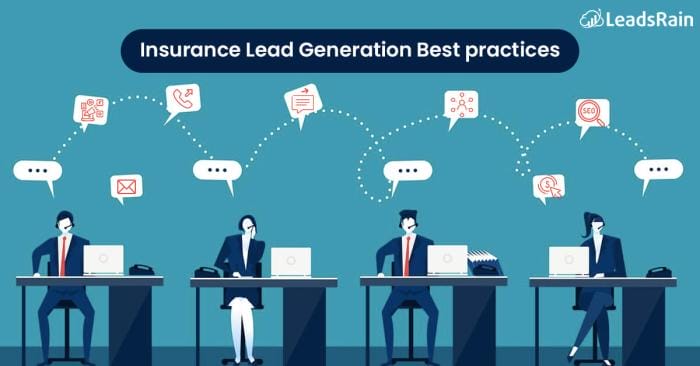In today’s digital landscape, lead generation has become a cornerstone for insurance agents seeking to expand their clientele and drive business growth. With an abundance of resources and strategies available, mastering the art of lead generation can be a daunting task.
This comprehensive guide delves into proven techniques, innovative approaches, and industry insights to equip insurance agents with the knowledge and skills necessary to generate a steady stream of qualified leads, nurture relationships, and ultimately achieve remarkable success.
From harnessing the power of social media and optimizing websites for search engine visibility to crafting compelling email campaigns and leveraging data analytics, we’ll explore the intricacies of lead generation in the insurance industry. Discover how to create valuable content that resonates with potential clients, build strong online presence, and nurture leads through personalized follow-ups.
Whether you’re a seasoned agent or just starting out, this guide promises to provide actionable insights and strategies to elevate your lead generation efforts and unlock new avenues for business growth.
Effective Lead Generation Techniques for Insurance Agents

In the modern digital landscape, insurance agents must embrace innovative strategies to attract and engage potential clients. This comprehensive guide explores proven lead generation techniques that leverage social media, website optimization, and email marketing campaigns to drive success.
Leveraging Social Media Platforms
Social media platforms offer a powerful avenue to connect with potential clients and establish a strong online presence. Insurance agents should:
- Create engaging content: Share valuable insights, tips, and advice related to insurance and personal finance.
- Utilize paid advertising: Target specific demographics and interests through social media advertising campaigns.
- Engage with followers: Respond to comments, messages, and reviews promptly to foster relationships and build trust.
- Host webinars and live sessions: Provide educational content and interact with potential clients in real-time.
Optimizing an Insurance Agent’s Website for Lead Generation
A well-optimized website is crucial for attracting and converting potential clients. Insurance agents should:
- Create a user-friendly design: Ensure the website is easy to navigate and visually appealing.
- Include clear calls-to-action: Prompt visitors to take specific actions, such as requesting a quote or contacting the agent.
- Implement search engine optimization () techniques: Optimize website content and structure to improve search engine rankings.
- Use lead capture forms: Place strategic forms throughout the website to collect visitor information.
Creating Compelling Email Marketing Campaigns
Email marketing remains a powerful tool for nurturing leads and driving conversions. Insurance agents should:
- Build an email list: Collect email addresses through website forms, social media, and business cards.
- Segment email lists: Divide the email list into specific groups based on demographics, interests, or behavior to tailor messages.
- Craft compelling subject lines: Use concise and attention-grabbing subject lines to increase open rates.
- Personalize email content: Address recipients by name and include personalized recommendations or offers.
Building a Strong Online Presence
¶In today’s digital world, having a strong online presence is crucial for insurance agents to attract and engage with potential clients.
Optimizing Your Website for Search Engine
¶1.
-*Prioritize Speed and Performance
Ensure your website loads quickly and efficiently to provide a seamless user experience.¶2.
-*Conduct Regular Audits
Regularly assess your website’s search engine performance to identify areas for improvement.¶3.
-*Optimize Page Content
Create high-quality, relevant content that aligns with your target audience’s search queries.¶4.
-*Build High-Quality Backlinks
Focus on acquiring backlinks from credible and relevant websites to boost your website’s authority.
Engaging with Customers through Social Media
¶1.
-*Choose the Right Platforms
Identify the social media platforms where your target audience is most active and focus your efforts there.¶2.
-*Create Engaging Content
Share valuable content that resonates with your audience, such as industry insights, tips, and success stories.¶3.
-*Respond to Inquiries Promptly
Monitor your social media channels regularly and respond to inquiries and comments in a timely manner.¶4.
-*Run Social Media Ads
Utilize social media advertising to reach a wider audience and promote specific products or services.
Creating High-Quality Content that Attracts Clients
¶1.
-*Develop a Content Strategy
Create a plan that Artikels the types of content you will create, the target audience, and the distribution channels.¶2.
-*Choose the Right Content Format
Consider using a mix of blog posts, videos, infographics, and podcasts to cater to different learning preferences.¶3.
-*Focus on Quality
Invest time and effort into creating high-quality, well-researched content that offers value to your audience.¶4.
-*Promote Your Content
Share your content on social media, your website, and through email campaigns to reach a wider audience.
Utilizing Data and Analytics for Lead Generation

In today’s digital age, data is a valuable asset for insurance agents seeking to generate leads and grow their businesses. By collecting and analyzing customer data, agents can gain valuable insights into their target audience’s needs, preferences, and behaviors. This information can then be used to personalize marketing campaigns, improve lead quality, and track the effectiveness of lead generation efforts.
Collecting and Analyzing Customer Data
The first step in utilizing data for lead generation is to collect and analyze customer data. This can be done through various channels, including customer surveys, website analytics, social media data, and email marketing campaigns. By gathering information such as demographics, contact information, browsing history, and engagement metrics, agents can create a comprehensive profile of their target audience.
Personalizing Marketing Campaigns
Once customer data has been collected and analyzed, it can be used to personalize marketing campaigns and improve lead quality. By tailoring messages and offers to specific customer segments, agents can increase the relevance and effectiveness of their marketing efforts.
This can be done through targeted email campaigns, personalized website content, and social media advertising.
Tracking and Measuring Lead Generation Efforts
It is essential for insurance agents to track and measure their lead generation efforts to determine what is working and what is not. This can be done using analytics tools and software that provide insights into website traffic, lead conversion rates, and other key metrics.
By tracking their progress, agents can make informed decisions about their marketing strategies and adjust them as needed to improve results.
Creating Valuable Content for Lead Generation

Crafting compelling content is crucial for attracting potential clients and generating leads in the insurance industry. This content should be informative, engaging, and tailored to the needs and interests of your target audience.
There are various forms of content that can be utilized to generate leads. These include blog posts, landing pages, infographics, and videos. Each type serves a specific purpose and can be effective in capturing the attention of potential clients.
Blog Posts
Blog posts are an excellent way to share valuable insights, establish your expertise, and build a loyal following. When creating blog posts, focus on topics that are relevant to your target audience and provide practical advice or solutions to their problems.
Use engaging headlines, clear language, and visuals to make your posts more appealing and shareable.
Landing Pages
Landing pages are designed to capture leads and convert visitors into potential customers. They are typically used for specific marketing campaigns or promotions. When creating landing pages, ensure they are visually appealing, easy to navigate, and optimized for conversions. Use clear calls to action, compelling headlines, and persuasive copy to encourage visitors to take the desired action, such as signing up for a newsletter or requesting a quote.
Infographics and Videos
Infographics and videos are powerful tools for capturing attention and delivering information in a visually appealing and easily digestible format. Infographics are great for presenting complex data or statistics in a clear and concise manner. Videos can be used to demonstrate products or services, provide tutorials or tips, or share customer testimonials.
Both infographics and videos can be shared across various online platforms, including social media and email marketing, to reach a wider audience.
Nurturing Leads and Building Relationships

In the realm of insurance sales, nurturing leads and establishing enduring connections is crucial for driving conversions and fostering long-term client loyalty. Email marketing serves as a powerful tool in this endeavor, enabling agents to engage with leads, provide valuable information, and nurture relationships.
Personalized Follow-up Sequences
Crafting personalized follow-up sequences is an art form that can significantly elevate conversion rates. Begin by segmenting leads based on their interests, demographics, and engagement levels. Tailor subsequent emails to address each segment’s specific needs and concerns. Consider incorporating dynamic content, such as the lead’s name or relevant product information, to enhance personalization further.
Engaging Through Social Media
Harness the power of social media platforms to connect with leads and nurture relationships. Share industry insights, product updates, and testimonials to establish your expertise and build trust. Encourage engagement by posing thought-provoking questions, conducting polls, and hosting live Q&A sessions.
Monitor social media mentions and respond promptly to inquiries or feedback.
Effective Lead Generation Strategies for Different Insurance Products
Understanding the unique characteristics and customer needs for various insurance products is crucial for developing tailored lead generation strategies. Here’s how to effectively generate leads for different insurance products:
Life Insurance
Life insurance lead generation involves targeting individuals and families seeking financial security and protection. Strategies include:
- Partnering with financial advisors and estate planners to reach affluent individuals.
- Offering free consultations and webinars on life insurance planning.
- Creating content that highlights the importance of life insurance for different life stages.
Health Insurance
Health insurance lead generation focuses on individuals, families, and businesses seeking comprehensive medical coverage. Strategies include:
- Partnering with healthcare providers and brokers to access potential customers.
- Participating in health fairs and community events to raise awareness.
- Developing online tools and resources for comparing health insurance plans.
Auto Insurance
Auto insurance lead generation targets individuals and businesses seeking vehicle coverage. Strategies include:
- Partnering with car dealerships and auto repair shops to reach potential customers.
- Offering discounts and promotions for multiple vehicle policies.
- Creating content that educates consumers about auto insurance coverage options.
Other Insurance Products
Lead generation for other insurance products, such as homeowners, renters, and travel insurance, involves understanding the specific needs of each customer segment. Strategies include:
- Targeting homeowners associations and property management companies for homeowners insurance.
- Partnering with travel agencies and online booking platforms for travel insurance.
- Creating content that highlights the benefits of these insurance products for different scenarios.
By tailoring lead generation efforts to the unique characteristics of different insurance products and customer segments, insurance agents can effectively reach and engage potential customers, increasing their chances of converting leads into sales.
Measuring and Evaluating Lead Generation Performance
Tracking the effectiveness of lead generation efforts is crucial for insurance agents to optimize their strategies and maximize ROI. By monitoring key metrics, agents can gain valuable insights into the performance of their lead generation campaigns and identify areas for improvement.
Data Collection and Tracking
Begin by establishing a system for collecting and tracking relevant data. This may include metrics such as:
- Website traffic
- Form submissions
- Email open rates
- Click-through rates
- Conversion rates
- Sales pipeline progression
Interpreting Data and Identifying Trends
Once data is collected, it’s essential to analyze it to identify trends and patterns. Look for correlations between specific lead generation tactics and their impact on key metrics. This analysis can reveal which strategies are most effective and which ones need improvement.
Continual Monitoring and Adjustment
Lead generation is an ongoing process that requires continual monitoring and adjustment. As market conditions and customer preferences change, so too should your lead generation strategies. Regularly review your data and make adjustments to your campaigns based on what you learn.
Using Analytics Tools
Leverage analytics tools and software to help you track and analyze your lead generation performance. These tools can provide detailed insights into customer behavior, allowing you to make data-driven decisions about your lead generation efforts.
Utilizing Technology to Streamline Lead Generation

In today’s digital age, insurance agents can leverage technology to streamline their lead generation processes and enhance efficiency. By utilizing customer relationship management (CRM) systems, marketing automation tools, and artificial intelligence (AI) and machine learning (ML), agents can optimize their lead generation efforts and improve overall productivity.
CRM Systems for Lead Management and Tracking
Customer relationship management (CRM) systems serve as centralized platforms that enable insurance agents to manage and track leads effectively. These systems offer various features to streamline lead generation, including:
- Centralized Lead Database: CRM systems provide a single repository for storing and organizing lead information, ensuring easy access and retrieval.
- Lead Qualification: CRM systems allow agents to qualify leads based on specific criteria, helping them prioritize and focus on high-potential leads.
- Lead Nurturing: CRM systems facilitate lead nurturing by tracking lead interactions and providing automated follow-up messages, nurturing leads through the sales funnel.
- Performance Analytics: CRM systems offer analytics and reporting capabilities that enable agents to track their lead generation performance, identify trends, and make data-driven decisions.
Marketing Automation Tools for Streamlined Processes
Marketing automation tools can help insurance agents automate repetitive tasks associated with lead generation, saving time and improving efficiency. These tools offer a range of features, including:
- Automated Lead Capture: Marketing automation tools can capture leads from various sources, such as websites, forms, and social media, and automatically add them to the CRM system.
- Email Marketing: These tools enable agents to create and send personalized email campaigns to leads, automating the process of lead nurturing and engagement.
- Lead Scoring: Marketing automation tools can assign scores to leads based on their engagement and behavior, helping agents prioritize leads with higher conversion potential.
- Lead Distribution: These tools can distribute leads among sales teams or individual agents based on predefined criteria, ensuring fair and efficient lead allocation.
AI and ML for Improved Lead Generation Efficiency
Artificial intelligence (AI) and machine learning (ML) technologies can significantly enhance the efficiency of lead generation processes for insurance agents. These technologies offer a range of benefits, including:
- Lead Scoring and Prioritization: AI and ML algorithms can analyze lead data and behavior to assign lead scores, helping agents identify and prioritize high-value leads.
- Personalized Recommendations: These technologies can provide personalized recommendations for lead nurturing and engagement strategies based on individual lead preferences and behavior.
- Predictive Analytics: AI and ML algorithms can predict lead behavior and conversion probability, enabling agents to focus on leads with higher chances of converting into customers.
- Chatbots and Virtual Assistants: AI-powered chatbots and virtual assistants can engage with leads in real-time, providing instant responses and scheduling appointments, improving lead conversion rates.
Staying Up-to-Date with Industry Trends

Navigating the dynamic landscape of the insurance industry necessitates staying abreast of emerging trends and developments. This knowledge empowers insurance agents to adapt their strategies, optimize their services, and anticipate the evolving needs of their clients. By maintaining a finger on the pulse of industry advancements, agents can position themselves as trusted advisors, offering tailored solutions that resonate with the changing market dynamics.explanatory
paragraphTo stay informed and competitive, insurance agents should leverage a variety of resources to gather industry insights. Regularly monitoring reputable news outlets, industry blogs, and social media platforms can provide valuable updates on the latest developments. Additionally, attending industry events, conferences, and workshops offers opportunities for networking, knowledge sharing, and exposure to cutting-edge innovations.
Engaging with Industry Experts
[detailed content here]
- Participating in online forums, webinars, and podcasts hosted by industry experts allows agents to gain diverse perspectives and stay informed about emerging trends.
- Establishing connections with peers and thought leaders through professional associations and networking events fosters a collaborative environment for sharing best practices and insights.
- Seeking mentorship from experienced insurance professionals provides valuable guidance and insights into industry dynamics, helping agents navigate challenges and capitalize on opportunities.
Case Studies and Success Stories

Insurance agents can gain valuable insights and inspiration by examining case studies of successful insurance agents who have effectively implemented lead generation strategies. These case studies provide real-world examples of innovative methods used to generate leads and grow insurance businesses.
By analyzing the strategies employed by successful insurance agents, agents can identify key takeaways and lessons learned that can be applied to their own lead generation efforts. These success stories highlight the importance of staying up-to-date with industry trends, utilizing technology, and building strong relationships with clients.
Examples of Successful Insurance Agents
- Agent A: Increased Leads through Content Marketing
- Agent B: Leveraging Social Media for Lead Generation
- Agent C: Building Partnerships for Lead Generation
Agent A, an insurance agent specializing in life insurance, successfully generated leads through content marketing. By creating valuable and informative blog posts, articles, and videos, Agent A attracted a large audience of potential clients. The agent’s content focused on providing helpful information about life insurance, addressing common concerns and misconceptions, and offering practical advice.
Agent B, an insurance agent specializing in auto insurance, effectively utilized social media platforms to generate leads. By creating engaging and interactive content, Agent B attracted a large following on social media. The agent’s social media presence allowed them to connect with potential clients, answer their questions, and promote their insurance products.
Agent C, an insurance agent specializing in commercial insurance, successfully generated leads through partnerships with other businesses. By collaborating with local businesses and organizations, Agent C gained access to a wider network of potential clients. The agent’s partnerships allowed them to cross-promote products and services, resulting in increased leads and sales.
Key Takeaways and Lessons Learned
These case studies highlight several key takeaways and lessons learned that insurance agents can apply to their own lead generation efforts:
- Content is King: Creating valuable and informative content that addresses the needs and concerns of potential clients is essential for lead generation.
- Embrace Technology: Utilizing technology, such as social media platforms and lead generation software, can streamline lead generation efforts and reach a wider audience.
- Build Strong Relationships: Establishing strong relationships with clients and partners is crucial for generating leads and growing an insurance business.
Conclusion

As the insurance industry continues to evolve, staying informed about the latest trends and technological advancements is crucial for insurance agents to maintain a competitive edge. Embrace ongoing learning, attend industry events, and seek opportunities to network with peers to gain valuable insights and stay ahead of the curve.
By consistently refining lead generation strategies, leveraging technology, and nurturing relationships with potential clients, insurance agents can unlock the full potential of their business and achieve long-term success.
Helpful Answers
Q: How can insurance agents leverage social media to attract potential clients?
A: By creating engaging content, actively participating in relevant online communities, and utilizing targeted social media advertising, insurance agents can effectively attract potential clients through social media platforms.
Q: What are some best practices for optimizing an insurance agent’s website for lead generation?
A: Optimizing website content for relevant s, ensuring a user-friendly design, and incorporating clear calls to action are key strategies for improving website visibility and generating leads.
Q: How can insurance agents create compelling email marketing campaigns to nurture leads?
A: By personalizing email content, segmenting email lists, and tracking campaign performance, insurance agents can create effective email marketing campaigns that engage potential clients and drive conversions.



